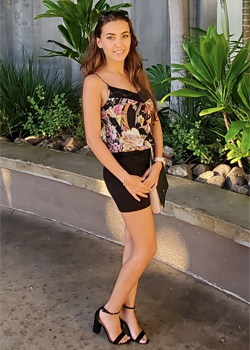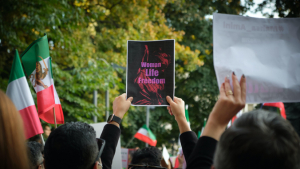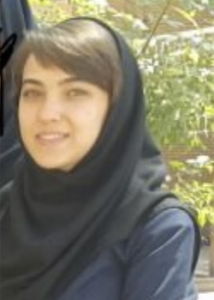
Anti-government protests and demonstrations have continued in Iran over the past month, despite violent government crackdowns. The protests were sparked when 22-year-old Mahsa Amini died while in police custody after being arrested for allegedly wearing her hijab improperly and showing a small amount of hair, breaking Iran’s strict hijab rules. More than 200 people have died as of mid-October in the protests, the most extensive in decades in Iran. Many of the protesters are university and high school students.
Faezeh Nejad is a University of Hawaiʻi at Mānoa biology pre-med student and an alumna of Honolulu Community College. She graduated from high school in Iran in 2017 and came to Hawaiʻi six months later with her mother and brother. Nejad is closely following the news back home and is greatly affected by what she is witnessing.
“It breaks me to see that people of my age and generation are dying only because they are peacefully asking for freedom,” Nejad said. “I have friends who have joined the protests and they were beaten and tear gassed by the guards. It is hard for me to carry on and live a normal life here when I know that the people in my home are losing their lives every day. Young people with a future ahead of them are risking their lives to fight for justice and basic human rights. I know that if I was in Iran I would also be joining the protests and possibly risk my life.”

Nejad says she was personally stopped by the morality police several times when she lived in Iran and told to correct her hijab.
“I was told that if I don’t correct my hijab or my behavior that I would be arrested and taken away by them,” said Nejad “I know other students from Iran are also affected by this situation. We do not have a way of contacting our family and friends, we do not know if they are safe or even alive.”
Journey to Hawaiʻi

Nejad, her mother and brother came to Hawaiʻi because her brother was almost 18 years old, and in Iran every 18-year-old male is required to serve in the military for two years. She and her brother were able to get visas because her mother is a U.S. born citizen. Nejad’s intention was not to stay in America, rather she wanted to go back to Iran and attend a medical school. She brought her books with her to Hawaiʻi to keep studying for the medical school entrance exam, and wanted to go back to Iran as soon as she received her green card, which took about a month.
However, after arriving in the U.S. she contemplated whether to stay or return home. Staying in the U.S. at the time meant starting over in academics. Nejad was not able to transfer any advanced placement courses, and she was not familiar with the language or the process to even attend a university here. On the other hand, she could leave and return to Iran where she was almost ready to attend medical school. However, that meant Nejad would give up on the freedom that she experienced in the short time she was in the U.S.
“In the end I decided that having freedom and liberty as a woman was worth sacrificing my academic progress in Iran and starting over here in the U.S.,” Nejad said.
After almost two years of working full time in a corporate office and learning English, she decided to go back to school and attended Honolulu CC for about three years, and was able to complete an associate’s degree in liberal arts with focus on natural science. Nejad then enrolled at UH Mānoa in spring 2022. Aside from pursuing a degree in biology, she is a member of the Pre-Medical Association, Medical Student Mentorship Program, Health Occupations Students of America and CORPS Hawaii. Nejad is also a learning assistant in the School of Life Sciences under Professor Megan Porter.
Sharing her story
While she is excelling in the classroom, her thoughts continue to be with her people in Iran.
Related: UH student with message on youth revolution in Iran, KHON
“I want people to know that what is happening in Iran is not about religion or hating Islam. It is about women having the right to choose what they want to wear whether it is hijab or not. It is about people wanting to have a normal life and not being afraid to live a life that most people have around the world,” Nejad said. “…They need people like me and you who have the right to speech and expression to be their voice and bring attention to this crisis. Many major national news outlets do not cover what is happening in Iran for political reasons. That is why everyone else who has the resources and is able to talk about this issue needs to do so.”
Nejad said that by choosing to share her story means she will not be able to go back to Iran until the current regime is over. She said her name will be added to their list of people who need to be prosecuted for talking against the regime. She made this choice, however, to fight for freedom and justice even when it means she possibly can never return to her homeland again.
“This is why I am using my voice and freedom to talk about this issue and be the voice of the voiceless,” Nejad said. “This is about human rights, and it is a fight for freedom more than anything else.”

